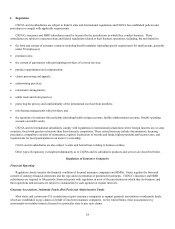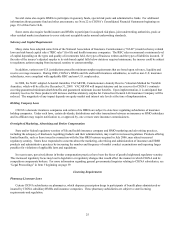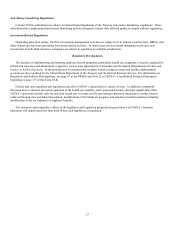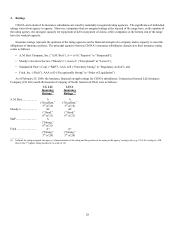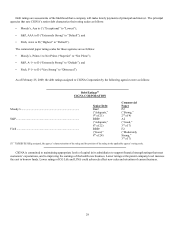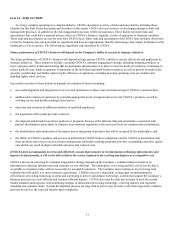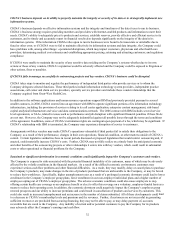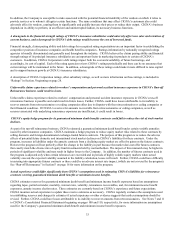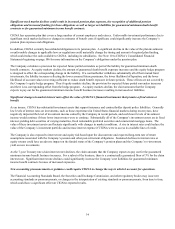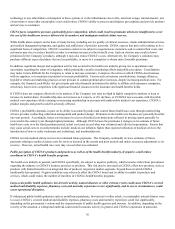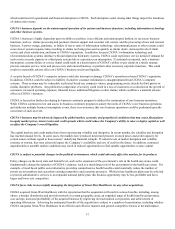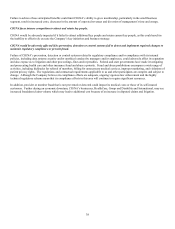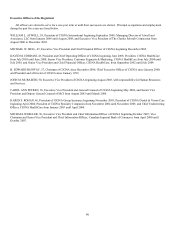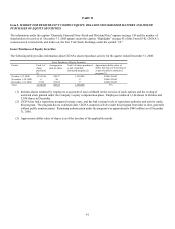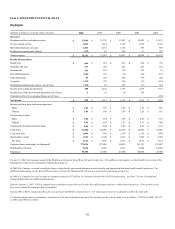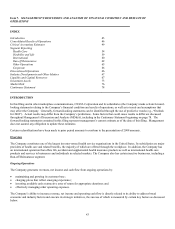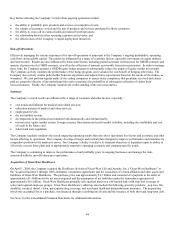Cigna 2008 Annual Report Download - page 54
Download and view the complete annual report
Please find page 54 of the 2008 Cigna annual report below. You can navigate through the pages in the report by either clicking on the pages listed below, or by using the keyword search tool below to find specific information within the annual report.34
Significant stock market declines could result in increased pension plan expenses, the recognition of additional pension
obligations and increased funding for those obligations as well as larger net liabilities for guaranteed minimum death benefit
contracts or for guaranteed minimum income benefit contracts.
CIGNA has a pension plan that covers a large number of current employees and retirees. Unfavorable investment performance due to
significant stock market declines or changes in estimates of benefit costs if significant, could significantly increase the Company’s
pension plan expenses and obligations.
In addition, CIGNA currently has unfunded obligations in its pension plan. A significant decline in the value of the plan investments
or unfavorable changes in applicable laws or regulations could materially change the timing and amount of required plan funding,
which could reduce the cash available to CIGNA, including its subsidiaries. See Note 10 to CIGNA’s Consolidated Financial
Statements beginning on page 106 for more information on the Company’s obligations under the pension plan.
The Company calculates a provision for expected future partial surrenders as part of the liability for guaranteed minimum death
benefit contracts. As equity markets decline, the amount of guaranteed death benefit exposure increases and the equity hedge program
is designed to offset the corresponding change in the liability. If a contractholder withdraws substantially all of their mutual fund
investments, the liability increases reflecting the lower assumed future premiums, the lower likelihood of lapsation, and the lower
likelihood of account values recovering sufficient to reduce death benefit exposure in future periods. These effects are not covered by
the Company’s equity hedge program. Thus if equity markets decline, the provision for expected future partial surrenders increases
and there is no corresponding offset from the hedge program. As equity markets decline, the claim amounts that the Company
expects to pay out for the guaranteed minimum income benefit business increases resulting in increased net liabilities.
Significant changes in market interest rates affect the value of CIGNA's financial instruments that promise a fixed return or
benefit.
As an insurer, CIGNA has substantial investment assets that support insurance and contractholder deposit policy liabilities. Generally
low levels of interest rates on investments, such as those experienced in United States financial markets during recent years, have
negatively impacted the level of investment income earned by the Company in recent periods, and such lower levels of investment
income would continue if these lower interest rates were to continue. Substantially all of the Company’s investment assets are in fixed
interest-yielding debt securities of varying maturities, fixed redeemable preferred securities and commercial mortgage loans. The
value of these investment assets can fluctuate significantly with changes in market conditions. A rise in interest rates could reduce the
value of the Company’s investment portfolio and increase interest expense if CIGNA were to access its available lines of credit.
The Company is also exposed to interest rate and equity risk based upon the discount rate and expected long-term rate of return
assumptions associated with the Company’s pension and other post-retirement obligations. Sustained declines in interest rates or
equity returns could have an adverse impact on the funded status of the Company’s pension plans and the Company’s re-investment
yield on new investments.
As the 7-year Treasury rate (claim interest rate) declines, the claim amounts that the Company expects to pay out for the guaranteed
minimum income benefit business increases. For a subset of the business, there is a contractually guaranteed floor of 3% for the claim
interest rate. Significant interest rate declines could significantly increase the Company’s net liabilities for guaranteed minimum
income benefit contracts because of increased exposures.
New accounting pronouncements or guidance could require CIGNA to change the way in which it accounts for operations.
The Financial Accounting Standards Board, the Securities and Exchange Commission, and other regulatory bodies may issue new
accounting standards or pronouncements, or changes in the interpretation of existing standards or pronouncements, from time to time,
which could have a significant effect on CIGNA's reported results.


